
Dantalion knew his wife’s yawns better than her smiles. He had only ever seen her at night, unless it had been during hurried journeys, when he would wake her before dawn and ride until after nightfall, pushing her past exhaustion. He had never seen her wide-awake and rested.
“Now you shall be sleeping as much as you like,” he murmured into her hair. “You won’t be waiting up nights for me, for I shall be with you always. And it’s long past dawn we two together shall be lying, if we’re feeling lazy,” he whispered.
To him, after weeks of stealing away in the cold dawn, lying in bed with his wife until noon had come to seem the pinnacle of earthly pleasures – but Eithne only shivered, and he could not believe it was with delight. It might have been revulsion at the thought of lying beside him, or merely his cold breath on her neck. He sat back, away from her, abashed.
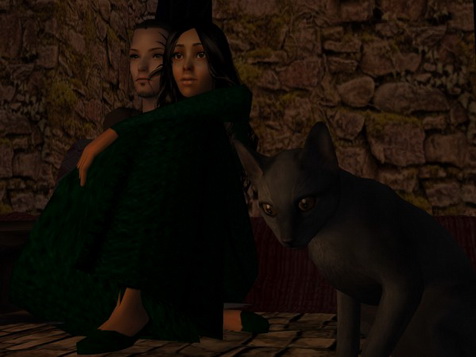
“You must be tired,” he mumbled. “Let me be telling it as a bedtime story, as when you were a little lass. The story of how the world was made, so you will understand.”
She said nothing, but she moved slightly, swaying with limp-limbed fatigue. He had scarcely ever seen her otherwise.
“Once…” he began, and then he paused to consider.
“…upon a time,” she sighed wearily after a while.
“I knew that,” he huffed. “I was simply deciding how best to proceed, seeing as time had not been created yet.”
Eithne snorted. “You had better be getting some practice with the telling of bedtime stories, lad. I’m thinking a four-year-old won’t have the patience for you to ‘decide how best to proceed’.”
Dantalion sat well back, more than abashed. He had a vague and slightly discomfiting idea that there would be babies in the summer, but he had not considered that at some point his children would be four-year-olds.
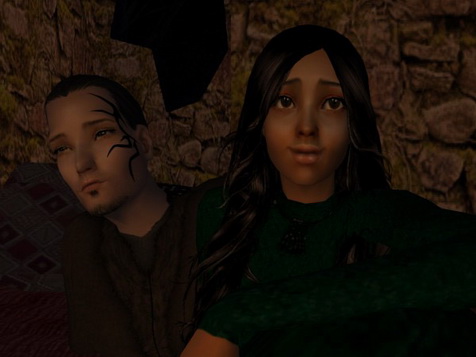
“Are you thinking they’ll be wanting me to tell them stories?” he asked.
“Every night! And woe unto you if you’re not telling the story exactly the same every time!” she declared. “If you’re wanting to memorize a thing, tell it to a four-year-old as a bedtime story. Not one jot nor tittle are they forgetting.”
“But if they aren’t forgetting the story,” he protested, “why are they wanting to hear it told?”
Sweetdew finally sneezed and flopped onto her side, squirming with silent laughter.
Eithne sighed. “Tell me your story, lad. You’ve a lot to learn.”
This sigh did not quite sound weary, and Dantalion leaned in, trying to get a look at her face. “Are you making fun of me?” he asked suspiciously.
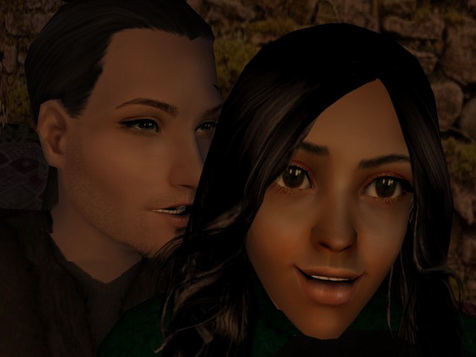
Eithne squeaked and giggled wickedly: his own silly, playful little wife flaring up again, in that frail body over which he had so often brooded like a man trying to blow warmth back into dead coals, and succeeding when he least expected it.
If he had been a masterly poet like Foras, he might have found his way back to her with beautiful words. Instead it was his foolishness that touched her, leading him to the humbling conclusion that he was no more than a masterly fool. Nevertheless, he found he did not mind her laughing at him, so long as she laughed.
“So,” he pretended to grumble, “let us suppose I begin after time was created, and avoid this difficulty. Once upon a time…”
He paused again, for his story was grave, and not in keeping with her giggling or his grumbling. He reached around her to take her hand into his.
“In the beginning,” he said at last, “there was God the Father, the Most High, and with Him was God the Son, and the Holy Spirit, as you’re knowing. And they were all God.”

“I learned that when I was four,” she scoffed.
“Whisht! And there was nothing except God, and the cherubim and seraphim to praise Him, and a great, dark emptiness that was empty not like air but like the sea. And time.”
He reached around her with his other arm and took both her hands between his. In spite of the fire before her they were cold.
“And what happens to you, dear girl,” he asked, “when you have ever so much time, and nothing whatever to do?”
“I… take a nap,” she giggled.
“Eithne!” he sighed.
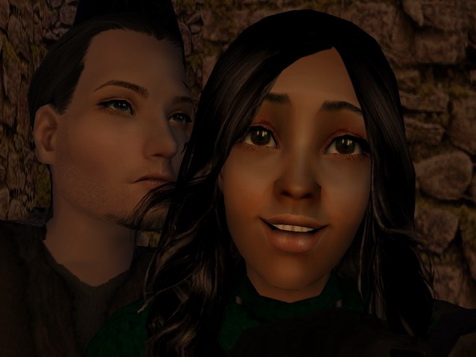
“I’m only pretending to be four!” she squealed. “If we’re waiting till they’re three-and-a-half before you start practicing…”
His arms tightened around her, and his face dove into her hair, and so he stayed, almost paralyzed, himself in the grip of an unfamiliar, heart-clenching panic. He wished time had never been created: for millennia it had seemed to drag like yards and yards of heavy chains behind him, and suddenly it was passing in a rush, and he was the one being dragged.
Eithne began to squirm. “I’m sorry,” she said fearfully. “I shall be sixteen again, and quiet…”
“No – it’s – I know nothing about small children,” he whispered in explanation.
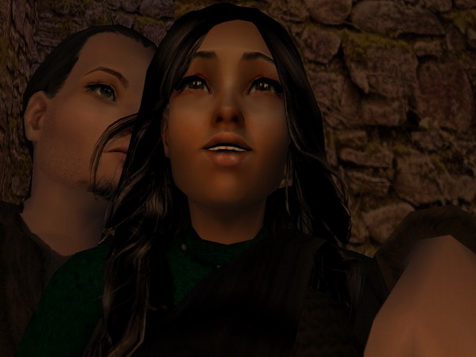
But it was not quite true. He knew how fragile they were – how easily injured, how easily frightened. He was beginning to understand that he would be just so fragile – just so easily injured, just so easily frightened. Or twice as much, because they were twins. Or ten times as much, because they were his.
“Ach!” Eithne wriggled her arm out from beneath his and patted his hand. “I’ve had the three little sisters, and nieces and nephews, and cousins aplenty. I shall help you.”
“Help me?” he gasped. If she had to help him, he reasoned, there must be something he would be expected to do. “Must I teach them to… to walk, and chew, and so forth…?”
Sweetdew sat up suddenly and flopped over again, laughing. “To chew!” she squeaked.

Eithne said, “You’d better be teaching them to chew if you don’t learn how to make a proper sandwich!”
She laughed impishly at her own joke for a moment, and then she shuddered and curved her body away from him and around her belly, as she sometimes did in her deepest sleep. When she slept he could simply curve his own body around hers, but now he was afraid to move and feel her cringe still farther away.
“But are you wanting them, Cian?” she asked, with such breathless intensity in the “wanting” that the words around it seemed to melt together in its heat.
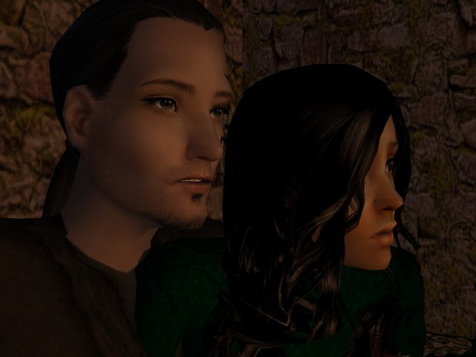
Dantalion was beginning to see that this experience would be more than merely a matter of shaking up a pair of dice and seeing what sort of magical beings would tumble out when he tossed them. He could not simply leave them to their mother and aunts if they grew bothersome, and come back when they were grown to claim their adoration and obedience.
He was binding himself wrist and ankle and soul, as he had never been bound by mere earth, by mere body, by mere black ward on his cheek. They would not be his so much as he would be theirs. His brother Foras, if he had known, would have declared him a masterly fool.
“Aye, lass. And you.”
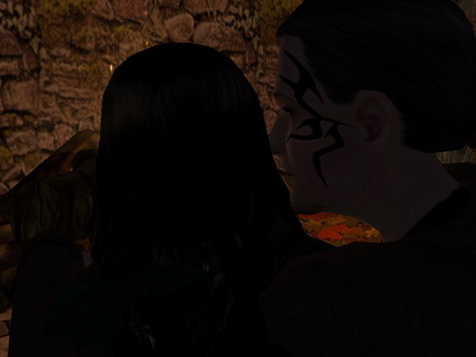






Those two are impossible! Every time I said, OK, now it's time to get serious and tell your story, something set them off again.
Thus this chapter did not go at all as planned, which means I have to write still another for December 4th. I think it is well past being the longest day in Lothere so far.